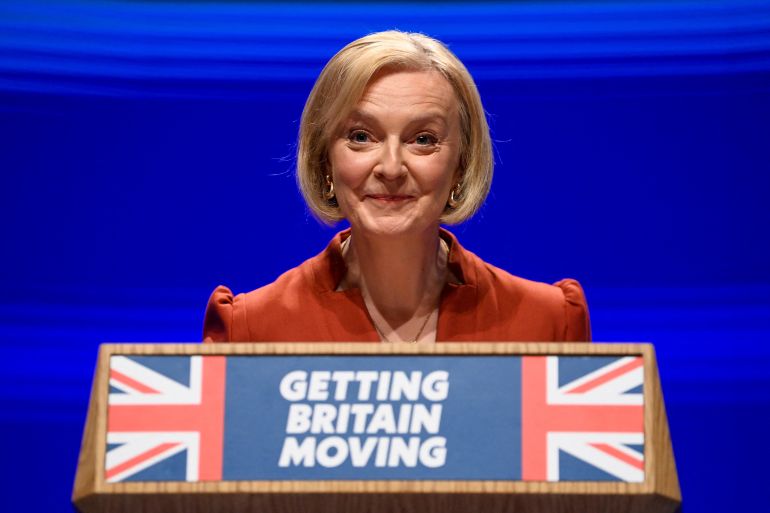UK’s Truss promises Tories her ‘disruption’ agenda will pay off
The British leader closes a Conservative Party conference with a pledge to ride out the turmoil unleashed by her tax-cutting agenda.

UK Prime Minister Liz Truss has pledged to ride out the turmoil unleashed by her tax-cutting agenda, saying the “disruption” will pay off in a wealthier, more efficient Britain.
Truss on Wednesday closed a tumultuous Conservative Party conference in the central English city of Birmingham with a speech intended to revive the spirits of delegates, saying, “I am ready to make the hard choices.”
Keep reading
list of 2 itemsLiz Truss’s neoliberal blitz is doomed to fail
Many in her party are in a glum mood after a four-day gathering that saw policy U-turns from the government, dire opinion polls and open rebellion from lawmakers who fear the party is doomed to lose the next national election under Truss, who took office just a month ago after winning a party leadership vote.
Truss promised to stick with her plan to reshape Britain’s economy through tax cuts and deregulation in a bid to end years of sluggish growth.
She said cutting taxes was “the right thing to do, morally and economically” and accused her opponents of being “anti-growth”.
After taking the stage to the strains of the 1990s hit “Moving on Up”, Truss acknowledged that “these are stormy days” for a country still mourning the death of Queen Elizabeth II and rocked by Russia’s invasion of Ukraine.
Truss shrugged off a brief protest by two Greenpeace activists who unfurled a banner in the hall reading, “Who voted for this?” They were escorted out of the hall to boos from the audience.
“Whenever there is change, there is disruption,” Truss said. “Not everyone will be in favour, but everyone will benefit from the result – a growing economy and a better future. That is what we have: a clear plan to deliver.”
Political, financial pressure
That plan already has many critics inside the Conservative Party. Truss’ first big policy, a stimulus package that includes 45 billion pounds ($50bn) in tax cuts to be paid for by government borrowing, alarmed financial markets when it was announced September 23.
The pound plunged to a record low against the US dollar, and the Bank of England was forced to intervene to prop up the bond market and stop a wider economic crisis.
Under political and financial pressure, the government on Monday scrapped the most unpopular part of its budget package, a tax cut on earnings above 150,000 pounds ($167,000) a year.
That will save about 2 billion pounds ($2.2bn), a small share of the government’s 45 billion-pound tax-cutting plan. Most economists say deep public spending cuts will be needed to pay for the rest.
The government said it will publish a fiscal plan with full costs outlined alongside an economic forecast from the independent Office for Budget Responsibility on November 23.
Truss defended the chaotic rollout of her economic measures, saying that in extraordinary times, “it would have been wrong not to have proceeded rapidly with our energy and tax plan.”
Truss argues that her policies will bring economic growth, higher wages and eventually more tax revenue for the government to spend.
Critics say the plans do little to help millions of people who are struggling right now with a higher cost of living fueled by soaring energy prices.
Truss insists she is committed to supporting the most vulnerable people, pointing to a cap on energy prices that took effect on Saturday.
But she has refused to promise that benefits and state pensions will increase in line with inflation, which has been the practice for years.
That has alarmed some Conservative lawmakers, who say it amounts to penalising the poor while giving tax cuts to the better-off. Several said during the conference that they would not vote for the measure.
Public backlash
Former Prime Minister Gordon Brown from the Labour Party said cutting benefits would provoke a huge public backlash.
“There will be a national uprising if this goes ahead because it is nothing to do with making the growth policies of the government work,” he told the BBC. “It is simply making the poor pay the price.”
In her speech, Truss depicted Britain’s economic challenges as part of the global crisis unleashed by Russia’s invasion of Ukraine as she promised to “stand by our Ukrainian friends, however long it takes”.
“The scale of the challenge is immense,” she said. “War in Europe for the first time in a generation. A more uncertain world in the aftermath of COVID. And a global economic crisis. That is why in Britain we need to do things differently.”
In a dig at her critics, Truss said that as a woman and graduate of a public high school – in a party dominated by privately educated men – “I know how it feels to have your potential dismissed by those who think they know better.”